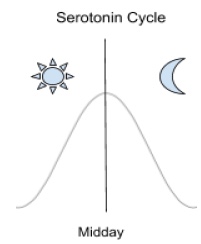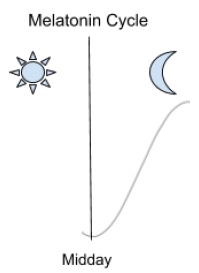By Eva Vitucci
Scientists have proven that it truly is harder for teens to wake up earlier than other age groups. While there are a few reasons that potentially drive this difference, it largely boils down to two main molecules that are produced in our bodies, melatonin and serotonin.
When we wake up in the morning and our eyes see light, they send multiple signals to the brain. Some of these signals tell the brain to “wake-up and make serotonin!” while others tell the brain not to make melatonin. Interestingly, as light decreases throughout the day and darkness increases, these signals change. The decrease in brightness turns down the body’s production of serotonin and turns on the body’s ability to break the already made serotonin down into melatonin. This build up of melatonin in the brain causes us to feel drowsy. Eventually, enough melatonin is produced and our body is signaled to sleep. Throughout the night, the melatonin levels are used up causing the “sleep” signal to decrease. It is this shift in signals from “sleep” to “wake-up” that eventually leads to the body’s natural awakening, and the restart of the entire process.
Interestingly, melatonin reaches its peak level much later in the evening for teenagers than adults. Thus, teenagers don’t receive the “sleep” signal till much later and can stay awake longer. This delayed peak in melatonin also means a delayed breakdown of melatonin and a delayed production of serotonin and the other “wake-up” chemicals. As a result, teenagers have a unique ability to sleep-in. Unfortunately, this also means it’s harder to wake up for the 8 am classes as it’s likely small amounts of melatonin still reside in your system and your body hasn’t produced its natural “wake-up” signals. This lingering presence of melatonin is also what can make you feel drowsy and less alert in the mornings.
Eventually, as the morning progresses, the melatonin is broken down and enough serotonin and “wake-up” signals are present to encourage a feeling of alertness; however, there are a few tricks to try to further help avoid or speed up this melatonin removal process. One option is to avoid sleeping-in too late on the weekends. This will help train your natural body clock to become an earlier riser. Another option is minimizing exposure to bright lights before bed, potentially through the use of blue light filters for phones and computers. This can help prevent your eyes from sending the “off” signals for melatonin production and can help your peak melatonin production occur sooner, end earlier in the morning, and make you feel less drowsy upon waking up. The most straightforward, but hardest solution to avoid feeling drowsy in the morning is, of course, going to bed earlier and earning more sleep.
Earning enough sleep, especially when forced to have an altered sleep-wake cycle is challenging, but extremely important. Sleep enforces mental and physical wellness, helps memories “stick”, helps muscles grow, and even helps us think more creatively. It’s estimated that teenagers need between 8-10 hours of sleep each night to reap these and other benefits of sleep and feel alert the next day. So, turn off those bright lights, get your melatonin pumping, and get ready to gain the amazing benefits of sleep! — Like this smart puppy here!–>
Edited by Rachel Cherney and Chad Lloyd



